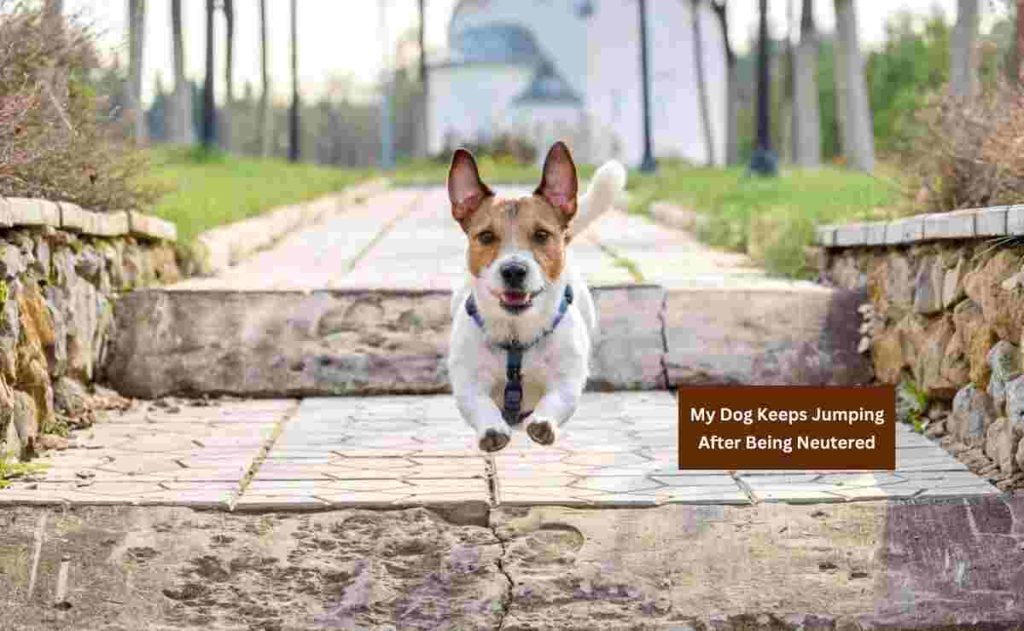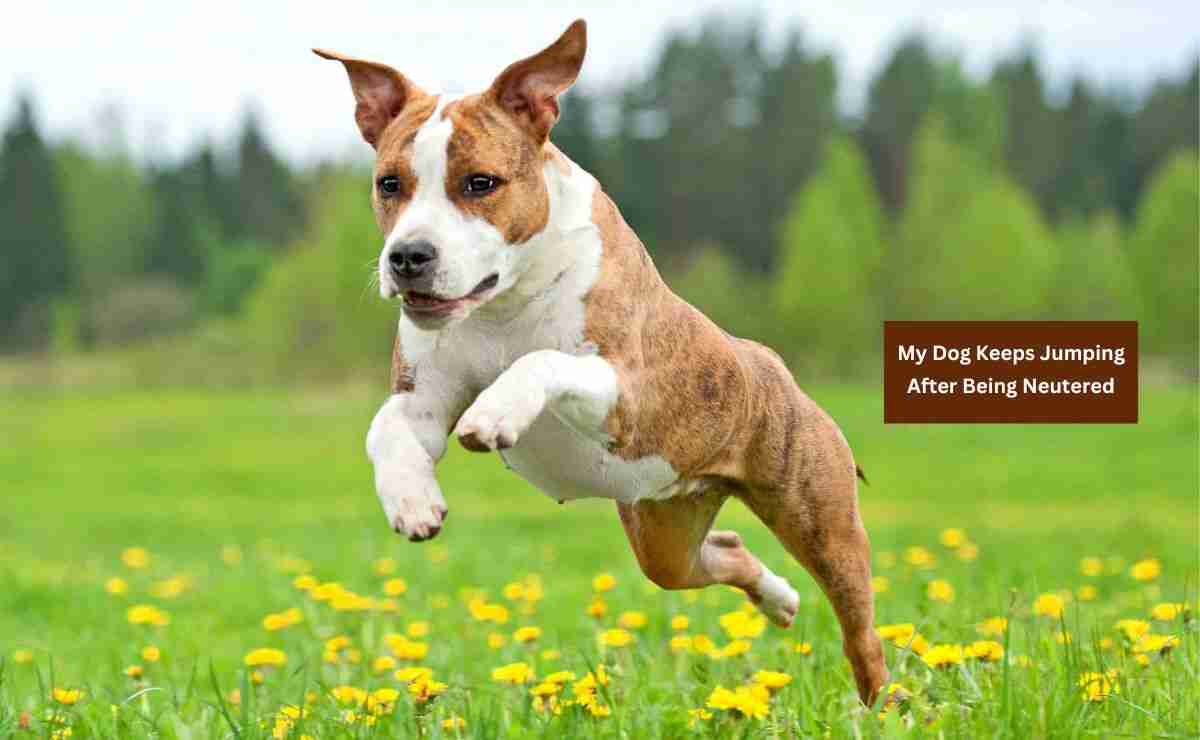My dog keeps jumping after being neutered — a common question asked by pet owners. Actually, it’s normal to be anxious for your beloved furry friend.
However, continuous jumping after being spayed or neutered is alarming. This behavior might stem from various aspects, like hormonal changes, feeling pain, discomfort during the recovery process, or even boredom.
So if your dog keeps jumping, that means something isn’t right. So you should find the actual reason as soon as possible and treat your pet.
Why Do My Dog Keeps Jumping After Being Neutered?

Dogs are quite energetic pets. However, after surgery, too much physical activity is not recommended, including jumping on the couch. Well, there are various reasons for jumping after surgery:
First of all, dogs do not fully understand which kind of treatment they get. So they become anxious and want to explore the changes, and that something leads them to jump around. It can be excitement, anxiety, or pain relief joy.
Remember, neutering is a surgical procedure, and your dog needs time to heal. The physical discomfort during the recovery phase can trigger jumping as they try to find a comfortable position or alleviate soreness. In their way, jumping can temporarily relieve their discomfort.
Furthermore, your dog can keep jumping to grab your interaction and engagement. If your dog’s usual activities are restricted during the recovery period, they resort to jumping to capture your attention or alleviate their boredom.
What happens if a dog is too active after neutering?
Neutering is a common veterinary procedure. Still, it’s essential to ensure a smooth recovery process to fully reap the benefits. Being overly active after neutering can have negative consequences on your dog’s healing process and overall well-being. For example:
Delayed Healing: Excessive activity can disrupt the healing process. Neutering involves surgical incisions, and they need time to close and heal properly. If your dog has too much movement or jumping, it can strain the incision site, leading to delayed healing, increased inflammation, and potential complications.
Opening of Incisions: Dogs that engage in high-energy activities or jumping can inadvertently open their surgical incisions. At this point, the situation gets complicated. It can be painful and requires additional medical attention to your dog to prevent infection. An opened incision could lead to a longer recovery time and your dog also feel discomfort.
Infection: Overactivity can expose your dog’s healing incisions to dirt, bacteria, and other contaminants. This raises the risk of infection and it is not good for your dog. They can feel uncomfortable and necessitate antibiotic treatment.
Internal Strain: Neutering is not just external incisions that need time to heal; internal tissues and structures are also recovering in that time. Too much activity can cause strain on these internal components, potentially leading to pain for your dog.
Inflammation and Swelling: Dogs that are overly active after neutering can cause inflammation and swelling around the surgical site. This can cause discomfort and hinder the healing process. The symptoms may indicate a more serious issue that requires veterinary care.
Behavioral Changes: Pain and discomfort resulting from too much activity can lead to behavioral changes in your dog. They become irritable, anxious, or avoidant due to the discomfort they are experiencing.
Seroma formation: It is a type of pocket of fluid that can form around the surgical site due to excessive movement. It causes initial pain but it often often resolves on its own. But in some cases, you may need to take them for veterinary care.
How To Prevent My Dog From Jumping After Neutered?
If your dog keeps jumping after being neutered, it can cause many complications. So you need to take the necessary steps to restrict your dog’s activity. Typically, the following 10-14 days of spayed are the recovery period. At that time, the veterinarian advises limiting normal activities to prevent risk.
Firstly, you need to ensure a relaxed and quiet environment and try to stay close to your dog to prevent anxiety or from getting too excited. It will prevent their jumping behavior.
You can make a comfortable and cozy spot on the floor. The comfortable spot encourages them to stay on it and avoid jumping.
You can install barriers or baby gates on the access dangerous areas where your dog tends to jump. For example, on the stairs or in rooms with furniture. Designate a quiet, comfortable space where they can rest without the risk of jumping.
Reinforce desirable behavior through positive training techniques. Reward your dog for remaining calm and not jumping. Use treats, praise, and affection as incentives to encourage them to stay grounded.
To keep your dog entertained and prevent boredom-related jumping, offer interactive toys and engage them in mentally stimulating activities. Puzzle toys and treat-dispensing toys can provide entertainment without the need for physical exertion.
While your dog needs to rest, short and controlled walks can be beneficial for their circulation and mental well-being. Ensure they are on a leash and avoid any strenuous activities during the walks.
If you’re concerned about your dog’s behavior or are unsure about how to manage their activity level post-neutering, consult your veterinarian. The vet can provide tailored advice according to the specific needs of your dog.
When Will Your Dog Calm Down After Neutering?
Hyperactivity or anesthesia of dogs caused by pain or the side effects of drugs. It should recover in a couple of days. But, dogs are not calm animals and they are not staying still for a long period. So, you have to do some extra work and effort to keep your dog calm for a few weeks after surgery. At least, you should be careful until the wound has healed.
In most cases, neutering wounds heal within around two weeks. However, it can different based on factors such as their age, breed, individual personality, and the extent of their pre-neutering behavior. Yet, female dogs are likely to take more time to heal due to their potential nature.
As your dog’s body continues to heal, it might start to regain some energy during weeks 2 to 3. However, it’s still advisable to limit their activity to short, controlled walks and avoid vigorous play. You might notice gradual improvements in their overall demeanor.
By the fourth week post-neutering, many dogs begin to show signs of calming down further. The incision site should be well on its way to healing, and your dog’s energy levels might be closer to their baseline. However, it’s still important to exercise caution and gradually reintroduce regular activities.
While there is no set timeframe for a dog to fully calm down after neutering, most dogs tend to return to their usual behavior within 6 to 8 weeks after the procedure. By this time, any residual discomfort or hormonal shifts should have subsided, and your dog’s energy levels and behavior should be more consistent with their pre-neutering state.
Frequently Asked Questions (FAQs)
How To Care for Dogs After Neutering?
After your dog has been neutered, proper care is essential for a smooth recovery. Limit their activity, prevent jumping, and keep them in a calm and controlled environment.
Is it normal for a dog to be hyper after neutering?
Yes, it’s common for dogs to exhibit hyperactive behavior after being neutered. It’s a result of various factors, including the effects of anesthesia, pain medication, or even discomfort.
Conclusion
Preventing your dog from jumping after being neutered is crucial for their healing and overall well-being. Too much activity during the recovery period can lead to delayed healing, increased risk of infection, strain on internal structures, and discomfort.
By using a combination of supervision, training, controlled environments, and mental stimulation, you can provide the best conditions for a smooth recovery. Remember, your efforts now will contribute to your dog’s long-term health and happiness.
